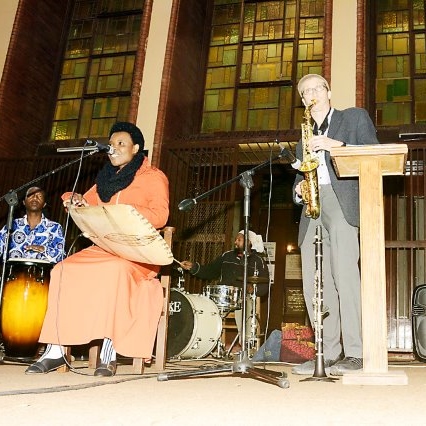click to dowload our latest edition
CLICK HERE TO SUBSCRIBE TO OUR NEWSLETTER


Published
6 years agoon
By
adminNICOLA MILTZ
Her stories of survival kept him enthralled, and no doubt shaped him into the man he has become.
Danneman, now a well-respected New York-based jazz musician, was drawn to the Holocaust and the Rwandan genocide. Understanding and interpreting the two periods in history has become his life’s work.
In a bid to try and connect people with a shared pain and common experience through the medium of music, he teaches communities about the causes and effects of war and genocide.
This passion placed him in the direct path of Rwandan musician and vocalist, Sophie Nzayisenga, in 2009. The two were introduced when Danneman, a saxophonist, clarinettist and composer, was doing street performances in Rwanda to commemorate the 15th anniversary of the genocide.
Nzayisenga – a Rwandan who lost members of her family during the genocide – is well known throughout Rwanda as a professional female Inanga player. The Inanga is a large, tough-zither instrument with between 8 and 16 strings.
Their friendship is an unlikely one. Nzayisenga barely speaks English. In fact, when they first met she could not even say “hello”, and Danneman is a Jewish guy from the Big Apple. Despite their obvious differences, there is a real musical bond.
“There was an instant connection the minute we were introduced,” Danneman said.
Over the years, the pair have kept in touch, Danneman was instrumental in arranging a visit to the US for Nzayisenga to perform. And last year, they released their first album together, “Honey Wine”.
The two have been in South Africa for the past two weeks performing for diverse audiences in Cape Town and Johannesburg as part of the commemoration of the 24th anniversary of the Rwandan Genocide. Their music is described as Afro folk jazz which fuses traditional African and Western music styles.
Initially, they performed at the Johannesburg Holocaust & Genocide Centre, together with percussionist Mpho Molikeng, and bass player Ariel Zamonsky. They performed for members of the Rwandan community living in Johannesburg, who lit candles in memory of those who died during the genocide. Among those present included Freddy Mutanguha, the Director of the Kigali Genocide Memorial and H E Vincent Karega, High Commissioner of the Rwandan High Commission, Embassy of the Republic of Rwanda.
Last Tuesday, the pair played together at the Temple Israel Heritage Centre in Hillbrow.
Reeva Forman, Chairperson of the Centre, said their street performance formed part of an initiative devoted to “sending a clear message against xenophobia and encouraging reconciliation and social cohesion”.
She said the aim was to “unite the people of Hillbrow and the inner city through music”.
The pair concluded their tour with a street performance outside the Temple titled “Bringing People Together Through Music”.
It brought to an end a whirlwind tour which included performances at the Orbit Jazz Club in Johannesburg, the Cape Town Holocaust and Genocide Centre, the Capricorn Primary School, the Alma Cafe, Olympia Bakery, and the Alexander Bar and Theatre.
They also met members of Ladysmith Black Mambazo, and toured various townships.
Danneman told the SA Jewish Report that he and Sophie have a special relationship. “We communicate through music. It’s been fantastic working with her. I knew about the Inanga instrument before I went to Rwanda in 2009. I had read about it, and I really wanted to find someone who played it. So it was great when we hooked up. There was a mutual respect and understanding.”
Danneman fell in love with street performing in 2009 after marching for 11 hours in the streets of New York with his saxophone. “I met all kinds of people, and I was really taken with the idea of how the artist can reach audiences across social lines.”
Around the same time, Rwanda was commemorating the 1994 genocide against the Tutsi people, a topic that Jeremy was interested in because his grandmother was a Holocaust survivor and had shared many stories about the war. He decided to give street performances in Rwanda to commemorate the genocide.
“It was an astounding experience to go to Rwanda and just start playing on the streets, meeting people and talking to them about what I was doing and why.”
He was then introduced to Nzayisenga by a local filmmaker. “Her father, Thomas Kirusu, was one of the most renowned Inanga players in Rwanda,” said Danneman, adding: “She’s been writing songs for twenty years, combining the traditional art form passed down from her father with her own contemporary melodies and poetry.”
In 2015, Danneman and Nzayisenga recorded their collaborative album, “Honey Wine”. “It’s been a great journey,” said Danneman, who lives in with his wife and child in New York, while Nzayisenga lives in Kigali.
This being his first visit to South Africa, he said, “It has been great to connect with other local musicians here. I’ve found the jazz scene dynamic and vibrant, with a multi-dimensional approach to music. Sophie and I are very happy to have played a role in the commemorations of the genocide against the Tutsi people in Johannesburg and Cape Town, and we hope we have brought some new audiences to the Holocaust centres at a time that is rampant with increased ethnic tensions globally.”
